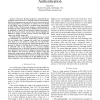Free Online Productivity Tools
i2Speak
i2Symbol
i2OCR
iTex2Img
iWeb2Print
iWeb2Shot
i2Type
iPdf2Split
iPdf2Merge
i2Bopomofo
i2Arabic
i2Style
i2Image
i2PDF
iLatex2Rtf
Sci2ools
133
click to vote
FC
2010
Springer
2010
Springer
On Robust Key Agreement Based on Public Key Authentication
—This paper discusses public-key authenticated key agreement protocols. First, we critically analyze several authenticated key agreement protocols and uncover various theoretical and practical flaws. In particular, we present two new attacks on the HMQV protocol, which is currently being standardized by IEEE P1363. The first attack presents a counterexample to invalidate the basic authentication in HMQV. The second attack is applicable to almost all past schemes, despite that many of them have formal security proofs. These attacks highlight the difficulty to design a crypto protocol correctly and suggest the caution one should always take. We further point out that many of the design errors are caused by sidestepping an important engineering principle, namely “Do not assume that a message you receive has a particular form (such as gr for known r) unless you can check this”. Constructions in the past generally resisted this principle on the grounds of efficiency: checking the ...
Authenticated Key Agreement | Cryptology | FC 2010 | Important Engineering Principle | Key Agreement Protocol |
Related Content
| Added | 15 Aug 2010 |
| Updated | 15 Aug 2010 |
| Type | Conference |
| Year | 2010 |
| Where | FC |
| Authors | Feng Hao |
Comments (0)

